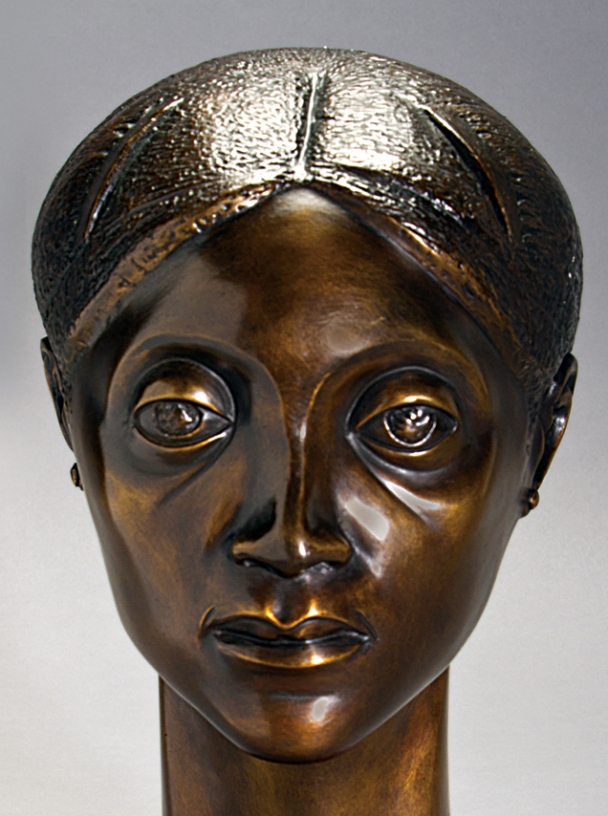
Jis’ blue, God,
Jis’ blue.
Ain’t prayin’ exactly jis’ now—
Tear-blind, I guess,
Can’t see my way through.
You know those things
I ast for so many times—
Maybe I hadn’t orter repeated like the Pharisees do;
But I ain’t stood in no market place;
It’s jis’ ’tween me and You.
And You said, “Ast” . . .
Somehow I ain’t astin’ now and I hardly know what to do.
Hope jis’ sorter left, but Faith’s still here—
Faith ain’t gone, too.
I know how ’tis—a thousand years
Is as a single day with You;
And I ain’t meanin’ to tempt You with “If You be . . .”
And I ain’t doubtin’ You.
But I ain’t prayin’ tonight, God—
Jis’ blue.
As far as I can tell, this poem was originally published in the July 1927 issue of The Forum, a magazine published from 1890 to 1950, and is now in the public domain.
+++
African American teacher, poet, and children’s book author Henrietta (“Etta”) Oldham (née Baldwin) was born September 21, 1888, in Big Spring, Texas. With husband Charles Oswald Oldham, she bore a daughter, Babette, but Charles died in 1922 at age thirty-three, and Etta never remarried. After Charles’s death, Etta spent seven years in Panama doing research for her book Pedro’s Pirate. She then returned to Texas, where she lived until her death in 1975.
Writing in African American Vernacular English, Etta gets real with God in her poem “Jis’ Blue,” laying all her frustration out on the table before him. The poem exemplifies the biblical practice of lament, of prayed sorrow. “Moving in our grief, confusion, and protest toward trust and thanksgiving in God and his promises” is the direction of biblical lament, writes J. Todd Billings in his book Rejoicing in Lament (46). While humility before God is a virtue, demureness is not. God wants us to be forthright with him. He much prefers honest emotional expressions to pasted-on smiles or disengagement.
Although its language can be sharp (Etta’s poem is much milder than most of the Bible’s lament psalms), lament is actually a form of praise, because it arises from the conviction that the Lord is a God of hesed, of “loving faithfulness”:
A conviction that God acts as the Lord who has bound himself in covenant love is at the theological center of the book of Psalms. . . . Because of their faith in God’s sovereignty, the psalmists have high expectations of God; because they take God’s promises seriously, they lament and protest when it seems that God is not keeping his promises. . . . The psalmists blame God in the interrogative, with raw, unanswered questions that cling to the hope of God’s covenant promises: Why am I in this crisis if the Lord’s covenant promise is true? In the context of covenant fellowship, God’s people can cry out to their covenant Lord—in complaint, even in protest and open-ended blame—until God shows his faithfulness according to his covenant promise. (50, 58–59)
Lament throws God’s promises back at him, says Billings. The promise that Etta calls God to account for is “Ask, and it will be given to you” (Matthew 7:7; cf. 21:22). I’ve asked and I’ve asked, she says, but still nothing. What’s the deal, God? Has my repetition become vain, invalidating my request [Matthew 6:7]? Come on, God, I’m not praying for show [Matthew 6:5–6]! Because she’s tired of asking and therefore refrains from doing so in this prayer, we don’t know what it is she’s seeking. We don’t know the object of her lament. But that enables the poem to speak more broadly into different contexts.
When we’re hurting in some way (physically, emotionally, or spiritually) and we grow weary of praying over and over again for relief, it’s perfectly acceptable to stop short of entreaty and simply tell God, “I’m just sad.” Jis’ blue. “So blind with tears, I can’t see straight.” That in itself is a prayer—an openness to God. Although Etta says she “ain’t prayin’ tonight,” she has done just that. Not in supplication mode but in lament mode. It’s how Christians pray their suffering.

Thank you for sharing such a moving poem, it’s like a modern psalm.
LikeLike
[…] (Related posts: “A sweeping vision of all things made new”; “‘Jis’ Blue’ by Etta Baldwin Oldham”) […]
LikeLike